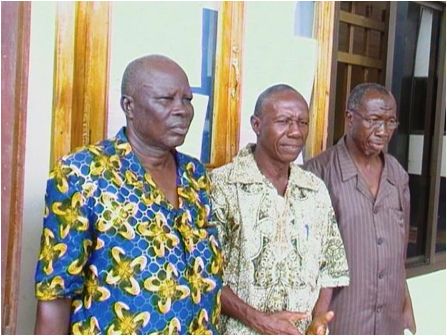Kono school boys vow to impregnate school girls
Sahr Patrick Fillie, Inspector of Schools in Kono District, on 24 July 2013 told the Parliamentary Education Committee at a hearing in Makeni that Kono schoolboys have vowed to impregnate school girls since government is only concerned with the education of the girl-child. (Photo: Kono team – Sahr Fillie, Sahr Y. Momodu, and Alhaji M.S. Foday, committed to education but very constrained)
To date, he said, ninety-eight percent of culprits found impregnating school girls in the district have been schoolboys, adding that the boys have vowed to continue impregnating girls until they also are included in the government’s grant given to the girl-child.
This is just one of the challenges facing girl-child education in the district, he said; another is the social aspect that the girls themselves give preference to.
“Because most of them are on their own when they come into the townships to attend senior secondary school they have to go out of the way to take care of themselves – and they are doing so by dating these schoolboys and motor bike-riders where in the process they get impregnated.”
One of the solutions to remedy this, he suggested, is the opening of senior secondary schools in all the 14 chiefdoms in the district instead of concentrating them in the major towns; doing that will keep the girls closer to home where they can be monitored by their parents and relatives.
But that is not all, rejoined Sahr Y. Momodu, Chairman, Head Teachers Council in Kono District – there are numerous teachers who are unpaid, he said, which is contributing to the deterioration of education in the district.
“The majority of these teachers are paid by the community and sometimes when there is no pay they abandon the schools, and you can’t blame them because they also have to live. Besides there are quite a good number of schools in Kono which are unapproved by the government even though they have met the criteria set out by the ministry of education. We don’t know what the delay for their approval is.”
Another reason for the drop in education in the district is mining, where majority of the labourers are teenage boys, boys who like the girls, are mostly from poor backgrounds.
Mr. Sahr Patrick Fillie said another challenge for them is that the education office in Kono is grossly understaffed – three out of the four inspectors of schools were retired some months back without their knowledge.
“These three went to the bank where they discovered that their salaries had stopped running and their services where no longer needed. The three of them are yet to be replaced,” he said.
Chairman, Conference of Principals of Senior Secondary Schools, Alhaji M.S. Foday, said most parents are not taking the education of their children as a priority – they only do it because they see their neighbours’ kids making progress educationally.
“We all know quality education is dropping, and this is due to the many voluntary teachers in the district, they have taken on other jobs because they have not been approved by the Ministry of Education. Yes, the attendance rate of students is good, but most of the teachers are volunteers. Another challenge is the late payment of subsidies. In fact, we have a lot of schools that have been left out in this subsidy issue.”
Another absurd thing as revealed by them is the schools that have been constructed under the EFA/FTI fund – Kono District has five such schools: Lei Agricultural Secondary School, Soa Junior Secondary School, M’Baoma II Municipal Junior Secondary School, Keoyo Municipal Junior Secondary School, and Aladura Junior Secondary School in Koidu – all are up and running but none of them have been unapproved.
“So what’s the point in having them built and leaving them unapproved? Another thing,” Mr. Fillie continued, “is the Sierra Leone Government grant-in-aid given to students in tertiary institutions. Kono has a quota of 50. After we have done all the interviews and send the recommended names to headquarters in Freetown, we have found out that not all of them are given the scholarships – so why say our quota is 50 when you know at the end of the day it is not that number that you are going to give to us?”
The Education Committee in its observations said there is a lot that needs to be done – a lot; otherwise education is still a far fetched dream for the people of Kono.
“All stakeholders of education should come on board and be serious about the issues that are affecting education, especially girl-child education, and resolve those issues very quickly,” said the Education Committee.
By Elias Bangura
Stay with Sierra Express Media, for your trusted place in news!
© 2013, https:. All rights reserved.






